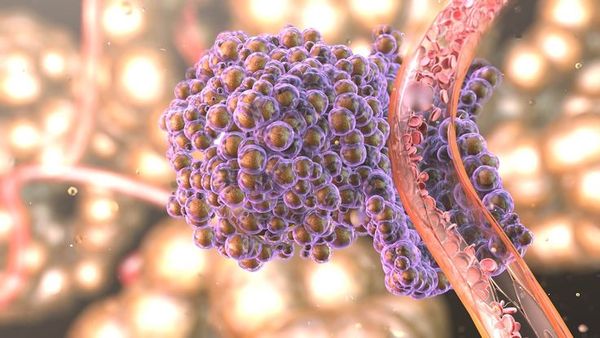- Does cannabis cure diseases? Are cannabinoids the key to treat diseases like Multiple Sclerosis or Alzheimer’s?
- Today we interview Viola Brugnatelli, a scientist specialised in the field of neuroscience who has focused her research on medicinal cannabis, cannabinoids and phytochemistry.
- Her interest in proving and publicising the benefits that plants can have for health, and specifically the therapeutic properties of cannabis, led her to create Nature Going Smart, an online magazine where she shares the results of scientific research .
- A tool that has been very useful for many patients who find on this website a source of reliable and trustworthy information.

You studied a degree in neuroscience. What led you to focus on medicinal cannabis?
I started studying neuroscience at the age of 20, my intention wasn't really to focus on medicinal cannabis, but when I found out that we have an endocannabinoid system, something clicked in my brain and I realised that there was a lot of research to be done. I had a prior interest in the plant, but it was only in 2012 that I started actively learning through research projects about the relevance of this system in our body and its importance for the correct development of our organism.
You direct an online magazine called Nature Going Smart. What can you tell us about this project?
Nature Going Smart started out as a blog to inform patients and general public about the advancements of research on cannabis & cannabinoids. I realised that, despite a large amount of work and hours of research, very few people were aware of the discoveries carried out by scientists about cannabis, and I wanted that information to be available to the world.
I wanted to offer both patients and the rest of the public the chance to understand how they can use this plant, and I started to explain it in Nature Going Smart. It is actually a project that is not only focused on cannabis, but it also covers other types of plants, and natural and alternatives therapies. Fortunately, I'm no longer alone in this project, there are now other experts from other field of research to build Nature Going Smart with. Scientific research is very important, but the publication of knowledge and of the progress made in the subject is also important. I had the idea of creating a magazine that could educate and offer serious and truthful information on the cannabis plant and its therapeutic uses, while writing it in a tone and a language that anyone could understand. What we are doing at Nature Going Smart is avoiding scientific jargon and communicate information in a clear and simple way, so that those who wish to, can use that knowledge for their health.
We offer information based on scientific facts. We are now implementing an advisory service for patients: a safe place where they can access specific programs to target their needs.
Has it been scientifically proven that cannabis is effective in the treatment of neurodegenerative diseases?
There is a lot of scientific evidence suggesting that cannabis is a powerful neuroprotectant and studies are under way to proven that cannabinoids are an effective treatment for diseases such as Parkinson's & Alzheimer's.
We have robust scientific evidence that supports its use for degenerative disorders such as Multiple Sclerosis & ALS. Timing is fundamental: starting to treat the patient at the initial phase of the disorder yield far better results than when is very advanced. Neurodegenerative diseases are chronic and degenerative illnesses. What happens in many cases is that patients consider cannabis to be the last resort, the last tool to use after torturing themselves with traditional medicine treatments for years, without very positive results. Marijuana is their last hope.
Most patients I work with are people who have already tried a lot of very aggressive treatments that have greatly reduced the responsiveness of their immune systems, yet, ironically, are sceptic about trying cannabis.
Depending from the stage of the disease progression, you can assist different results, sometimes, cannabinoids are not going to reverse a disease, but will most definitely improve the quality of the life and slower the degeneration.
To give you an example, the first time I met A. a 32 years old patient with Multiple Sclerosis, the mobility in lower and upper body was completely lost, and the only movement was coming from a finger. He had to be fed and moved and had no autonomy whatsoever.
Now, after a few months of treatment with CBD oil and cannabis, he has regained the use of his hands, diminished rigidity and decreased pain, drastically improving the quality of his life. Yes, he is still unable to walk and still has multiple sclerosis, but can push his chair and eat by himself in just a few months of treatment.
This is one of many cases, so the answer is yes, cannabis has important properties for the treatment of neurodegenerative diseases, the problem is that for many patients it is the last resort.
Cannabis cannot create new neurons out of nowhere so to speak, it acts as a protector, not as a creator, that's why it's so important to start the treatment early. It's very sad that the patient isn't given the chance to choose, that the healthcare system does not provide information on treatment with cannabinoids.
I think that when a person is diagnosed with a serious disease, the patient is gripped with fear, and fear is a crucial factor to prevent an individual from trying anything that isn't prescribed by a man in a white lab coat; the doctor becomes god and if he says you should receive chemotherapy, benzodiazepines, immunesoppressors and so on, you do it, without thinking critically.
It's very sad that the patient isn't given the chance to choose, that the healthcare system does not provide information on treatment with cannabinoids so that they can choose.
What benefits does cannabis provide for people suffering from multiple sclerosis?
It acts as a muscle relaxant and helps to alleviate the muscle rigidity that this disease produces. It also helps to combat neuropathic pain that is often associated to this disease, as it is a good analgesic.
On the other hand, CBD is a great anti-inflammatory and neuroprotectant, meaning that this substance is incredibly important to slow down the degenerative process of this disease. The brain's neuronal cells are interconnected by channels that link them. These bridges, which would be a kind of "cables", are covered by a layer. What this disease does, is deteriorating that protective layer covering the "cables" and when that happens, communication between the neurons also deteriorates. Not only is the message that one neuron sends to another lost, the immune system also becomes hyperactive and starts to fight itself.
What really works and is so important about cannabis is that it keeps the dangerously hyperactive immune cells away from the brain, preventing further degeneration at the protective layer that interconnects brain cells, aiding to rebuild it.
It is also worth highlighting that sufferers of multiple sclerosis have a lot of trouble with sleeping and voiding the bladder, and when they receive treatment with cannabis, these problems disappear.
When you are capable of proving scientifically that cannabis can replace many drugs, you stop receiving funds to finance your research.
Despite the high number of scientific studies supporting the effectiveness of cannabis in the treatment of neurodegenerative diseases, many governments still refuse to regulate it for medicinal use. Why do you think this happens?
I know that some people won't like this, but I think that there are many economical interests; lobbies of pharmaceutical companies put pressure on governments to prevent cannabis regulation.
I would even go as far as saying that there are also interests in the food industry, as it is a "partner" of the pharmaceutical industry when it comes to keeping us unhealthy, that's my point of view.
The situation is as follows: we have these two powerful industries, wanting to make as much money as possible, and the only way they can do this is, by pushing us eat food that creates disease, so we end up needing medications.
Drug industries can then commercialise chemicals that temporarily relieve symptoms, but which at the end of the day make us need another drug, which they obviously take care of selling us. To give you a very common example, there are many medicines which, when we take them, damage our stomach, so to solve this side-effect we have to buy a medicine that cures stomach pain, that's how this business works.
When you are capable of proving scientifically that cannabis can replace many drugs, you stop receiving funds to finance your research. You are basically proving something that is totally against their interests: that a plant that costs zero euros can replace a whole load of expensive drugs.
In the case of cancer, for example, many doctors still deny the importance of cannabis for its treatment. Others acknowledge that it's good for nausea and for pain, but they still recommend chemotherapy because they believe that cannabis is not a treatment for cancer, but rather a palliative.
We have a healthcare system that has become the goose that lays the golden eggs and they are going to defend it with all their might. The more sick people there are, the more money they will make. If you stop to think about it, every year life expectancy in the first world is lengthened. But what kind of life are we really gaining? We live longer, but in poorer health, that is the key that guarantees the succulent business of pharmaceutical corporations.
Cannabis has important properties for the treatment of neurodegenerative diseases, the problem is that for many patients it is the last resort.
Do the properties of cannabis vary depending on how it is consumed (vaporised, combusted, ingested…)?
Yes, totally. In fact I am a big defender of fresh cannabis juice. Unfortunately, growing your own cannabis is not allowed in most European countries and, alas, this is precisely what we need to make this juice, fresh cannabis. But yes, there is a big difference depending on how it is consumed at a chemical level, which leads to enormous differences regarding health benefits. In order to decide how we want to consume cannabis (oil, vaporiser, etc.), we have to take into account what method is the best to cure the disease in question.
What are the benefits?
When we consume fresh cannabis, we are consuming more than 400 components with important medicinal properties. You have to realise that many of them (terpenes, acidic cannabinoids, antioxidants, etc.) are lost when we consume them via a method where we have to apply heat or when the raw material is not fresh. The benefits are multifarious, it works for metabolic disorders, neurodegenerative diseases, as an anti-inflammatory, antifungal, antibacterial… In addition, you can consume large amounts of cannabinoids without any type of psychoactive effect.
Dinafem has recently launched its new catalogue of CBD-rich varieties. Have you heard of them? What is your opinion on the R&D work that has been carried out in the laboratory?
Yes, I have heard of them, and I sincerely believe that it's the way to go. Up until now the economy of the cannabis industry was supported by the recreational sector, not by the medicinal sector. What you are doing at Dinafem is building bridges between them. It turns out that these new genetics, which are incredibly valuable for the medicinal sector, are coming from the recreational sector; it's important to start creating new alliances between both sides.





Comments from our readers
There are no comments yet. Would you like to be the first?
Leave a comment!Did you like this post?
Your opinion about our seeds is very important to us and can help other users a lot (your email address won't be made public).